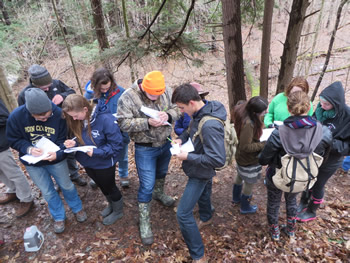Students & Faculty

Resources for Interested Students
Benefits of getting involved:
- Gain experience in the field of your choice
- Make connections with New York State Park employees
- Enhance your resume with notable skills and experience
- Try a variety of projects and fields to find out what you like
- Fill internship or volunteer requirements while doing something you love
- Help protect the beauty and biodiversity of New York State Parks by acquiring and sharing unique knowledge and skills

Internships: For a semester, summer, or other long- term commitment, students can consider applying for one of our existing internships or creating their own. All internships can be tailored to meet the needs of the students involved, and students are welcome to design their own internship based on their interests, the needs of the park they would like to work in, and their availability. We use the term 'steward' rather than 'intern' as we feel it more accurately describes the duties and responsibilities that we expect from students who chose to work with us. Stewards are caretakers, and by accepting one of these positions, you are agreeing to protect and conserve the areas or resources designated by your specific project or position. Environmental Stewardship is coming to be seen as one of the most positive ways that we, as humans, can interact with the natural world. Rather than attempting to either control or ignore them, we take an active role in improving and preserving these environments.
Research: Students wishing to gain research experience may find that state parks can provide the necessary locations to conduct the study they have in mind, or may be able to adopt a research question that a park has posed. Many research projects will focus on natural resource topics, but research opportunities are also possible in fields such as marketing, history, and planning and development.
Club trips: Clubs can get involved with FORCES by participating in service projects ranging from trail repair, and park structures maintenance to invasive species removal, trash pick- up, surveying and mapping, environmental outreach and education. Club trips to parks can be one-time events, or regular trips occurring once or twice a year. The best way to find out options for your club is to contact the FORCES staff in your region with a description of your club and what types of projects you would be interested in.
FORCES clubs: There are currently official FORCES clubs at six colleges- State University of New York College of Environmental Science and Forestry (SUNY ESF), Wells College, and Hartwick College, LeMoyne College, SUNY Geneseo and SUNY Oneonta.
Resources for Interested Faculty
Faculty can take advantage of FORCES and State Parks to enhance their labs and classes, as a resource for information, as a destination for trips or a location for long-term research.
Class trips: Professors can use state parks as a destination for class trips to utilize resources that are not available on their campuses. Though these are, of course, park and school specific, some examples include gorges, streams or wetlands, specific invasive species, and wildlife. These specific areas may allow professors to illustrate their lessons and provide hands-on activities that would not have been possible in a classroom or on campus. FORCES staff can often accompany class trips when requested, and can share their knowledge about the topic being discussed. Professors can also discuss the option of having FORCES staff or other park staff join their class for a lecture period and then lead an activity at a park as a follow-up. Options and opportunities for professors are very much dependent on the subject and interests of each individual professor. Contact FORCES staff to discuss options and possible collaboration.
Long-term projects and Research Collaboration: Professors can also involve their classes in long-term projects or research in parks. Some possible projects include monitoring of weather stations, conducting deer density studies, invasive species mapping, creation or monitoring of bird conservation areas, conducting wildlife track and sign surveys, and conservation of rare or threatened elements like the American hart’s tongue fern or the Chittenango ovate amber snail. Projects like these could be adopted by a class or professor and maintained as part of the course work. Long-term projects are often mutually beneficial for the classes and the parks, as they provide hands-on experience in unique settings for the students, and provide maintenance or data for the parks.